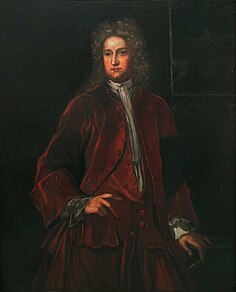Related Research Articles

The Province of Carolina was an English and later a British colony of North America. Carolina was founded in what is present-day North Carolina. Carolina expanded south and, at its greatest extent, nominally included the present-day states of North Carolina, South Carolina, Georgia, Alabama, Tennessee and Mississippi.

Sir William Berkeley was a colonial governor of Virginia, and one of the Lords Proprietors of the Colony of Carolina; he was appointed to these posts by King Charles I, of whom he was a favourite.
John Jenkins was an English soldier who served as governor of Albemarle four times: 1672-1675;1676-1677;1678-1679;1680-1681, becoming the only person who has served as proprietary governor so many times.
George Durant was an attorney, Attorney General and Speaker of the House of Burgesses in the Province of Carolina. He is sometimes called the "father of North Carolina".
A lord proprietor is a person granted a royal charter for the establishment and government of an English colony in the 17th century. The plural of the term is "lords proprietors" or "lords proprietary".
William Drummond was the first colonial governor of Albemarle Sound settlement in the Province of Carolina and a participant in Bacon's Rebellion.
Cary's Rebellion was an uprising against the Deputy Governor of North-Carolina in 1711 led by Thomas Cary, who refused to give up his governorship to Edward Hyde. The rebellion was a part of a long-standing tension between religious and political groups in northern Carolina, generally divided between the Quaker party, of which Cary was a part, and the Church of England party, to which Hyde belonged.

Lieutenant-General Josias Fendall, Esq., was the 4th Proprietary Governor of Maryland. He was born in England, and came to the Province of Maryland. He was the progenitor of the Fendall family in America.
Peter Carteret was the Governor of the British colony of Albemarle from 1670 to approximately 1672.
Thomas Miller was the acting colonial governor of North Carolina for about six months in 1677 during the absence of the official governor Thomas Eastchurch. During Miller's government, the Anti-Proprietors, led by John Culpeper, provoked the Culpeper's Rebellion.

Seth Sothel was a colonial American proprietor and governor of the Province of Carolina. He ruled the northern portion, Albemarle Sound, in 1678 and the southern portion from 1690 to 1692. He died in North Carolina in about 1694.
Henderson Walker (1659-1704) was the Acting Deputy Governor of North Carolina from 1699 to 1704. He is better known for his contribution in the founding of the Church of England in the Albemarle Sound region.
Culpeper's Rebellion was a popular uprising in 1677 provoked by the British Navigation Acts. It was led by John Culpeper against the ruling Lords Proprietor in Albemarle County, Province of Carolina, near what is now Elizabeth City, North Carolina. The uprising met with temporary success before being suppressed by English authorities.
Thomas Harvey (1668-1699) was the Deputy Governor of North Carolina from 1694 to 1699.
John Harvey was the governor of Albemarle Sound, in The Carolinas, in 1679.

Frances Culpeper Stephens Berkeley Ludwell, most commonly styled Lady Frances Berkeley after her second marriage, was a leader of the Green Spring faction of Virginia politics in the seventeenth century and wife to three colonial governors.

Trunajaya rebellion or Trunajaya War was the ultimately unsuccessful rebellion waged by the Madurese prince Trunajaya and fighters from Makassar against the Mataram Sultanate and its Dutch East India Company (VOC) supporters in Java during the 1670s.
References
- 1 2 3 4 5 6 7 8 9 10 11 12 13 NCpedia: THOMAS EASTCHURCH. Written by Dennis F. Daniel. Research Branch, NC Office of Archives and History, 2006.
- 1 2 3 4 5 6 7 8 9 Carolana: Thomas Eastchurch Appointed Governor of Albemarle 1677. Written by J.D.Lewis. 2007.
- 1 2 3 4 5 6 Culpeper Rebellion. North Carolina History project. 2015 John Locke Foundation.
- ↑ NCpedia: Thomas Miller. Written by Dennis F. Daniel. Research Branch, NC Office of Archives and History, 2006.